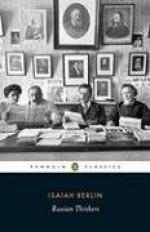
|
| Name: _________________________ | Period: ___________________ |
This test consists of 15 multiple choice questions and 5 short answer questions.
Multiple Choice Questions
1. Where did Belinsky receive encouragement?
(a) A liberal professor.
(b) A lover.
(c) An older writer.
(d) A German doctor.
2. How widely was Belinsky read?
(a) Belinsky was read even in the Russian provinces.
(b) Belinsky was only known in small circles of Petersburg intelligentsia.
(c) Belinsky was known primarily in Europe.
(d) Belinsky was only known in small circles of Moscow intelligentsia.
3. When did Russian Populism begin to decline?
(a) After the opening of the Trans-Siberia railroad in 1889.
(b) After the death of the Tsar in 1881.
(c) After the conviction of the Petrachevsky Circle.
(d) After the abolition of serfdom in 1861.
4. What has the consensus been about Leo Tolstoy?
(a) That he was ahead of his time as a thinker.
(b) That he was a brilliant novelist but a bad thinker.
(c) That he was really a cleric, more than a novelist.
(d) That he was more of a philosopher than a novelist.
5. What novel did Turgenev publish five years after Fathers and Children?
(a) A Nest of the Gentry.
(b) A Huntsman's sketches.
(c) Torrents of Spring.
(d) Smoke.
6. What balance did Belinsky strike in his career?
(a) Belinsky's life balanced between progress and conservatism.
(b) Belinsky's life balanced between literature and farming.
(c) Belinsky's life balanced between aristocracy and rusticity.
(d) Belinsky's life balanced between violence with restraint.
7. How was Belinsky described by the writers he influenced?
(a) Belinsky was described as the conscience of his generation.
(b) Belinsky was described as Russia's most optimistic Romantic.
(c) Belinsky was described as the aesthete of his generation.
(d) Belinsky was described as Russia's retrograde conservative.
8. Where did Tolstoy go to university?
(a) The University of Moscow.
(b) The University of Berlin.
(c) The University of Petersburg.
(d) The University of Kazan.
9. What was Tolstoy's opinion about his professors?
(a) Tolstoy believed that they contained the wealth of the world between themselves collectively.
(b) Tolstoy believed that they were fostering a revolutionary consciousness in their students.
(c) Tolstoy believed that they were undermining the aristocracy.
(d) Tolstoy believed that they wasted their time on trivialities.
10. What does the Russian word "Mir" mean?
(a) Russian laws.
(b) A political party.
(c) Freedom.
(d) Collective of communes.
11. What was Tolstoy's experience of European ideas?
(a) Tolstoy's travels throughout Europe showed him the superior forms of social organization.
(b) From his reading of European thinkers, Tolstoy saw the flaws in Russian society.
(c) After traveling to Europe, Tolstoy became contemptuous of European "expertise."
(d) Tolstoy's friendship with European writers showed him the inevitability of revolutionary change.
12. What European doctrine did Herzen deplore?
(a) The notion that Europeans are superior to Russians and others.
(b) The notion that Romanic idealism would triumph in workers' collectives.
(c) The notion that the mind is fed only by direct sensory experience.
(d) The notion that some must die for society to progress.
13. Whom did Belinsky identify as the father of Russian literature?
(a) Dostoevsky.
(b) Pushkin.
(c) Lermontov.
(d) Turgenev.
14. What balance did Herzen strike in his philosophy?
(a) A balance between revolutionary activities and aristocratic manners.
(b) A balance between political engagement and artistic remove.
(c) A balance between living naturally and making art.
(d) A balance between social justice and intellectual skepticism.
15. Who converted Belinsky to the idealism of Fichte and Schelling?
(a) Gogol.
(b) Stankevich.
(c) Goncharov.
(d) Herzen.
Short Answer Questions
1. What qualities did the characters based on Belinsky possess?
2. How was Fathers and Children received in Russia?
3. What does the Russian word "obshcnina" mean?
4. What values did Herzen share with the group he was part of?
5. What was the intellectual's role in the Populists' view?
|
This section contains 683 words (approx. 3 pages at 300 words per page) |

|




